Abdul Latif Jameel: 80 years of inspiring change
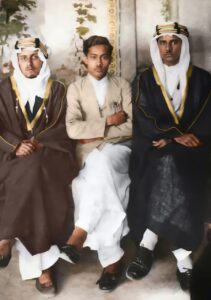
When the young Abdul Latif Jameel launched the business bearing his name in 1945, he could scarcely imagine what Saudi Arabia would look like eight decades later, let alone the world.
But Abdul Latif Jameel had a vision . . .
And despite the turbulent backdrop to his business’s foundation, he successfully established the principles for a venture that would prosper for generations – a business capable of adapting to fit the contours of a fast-evolving world yet forever remaining true to its original values.
“I did not have any specific job objectives, but I knew that you could not reach the top by sitting and doing nothing.
You have to make an effort; read a lot; work hard and look for challenges, instead of waiting for them to come to you,” he said in an interview for the ‘Okaz’ newspaper in 1981, outlining the reasons that prompted him to establish his own business.
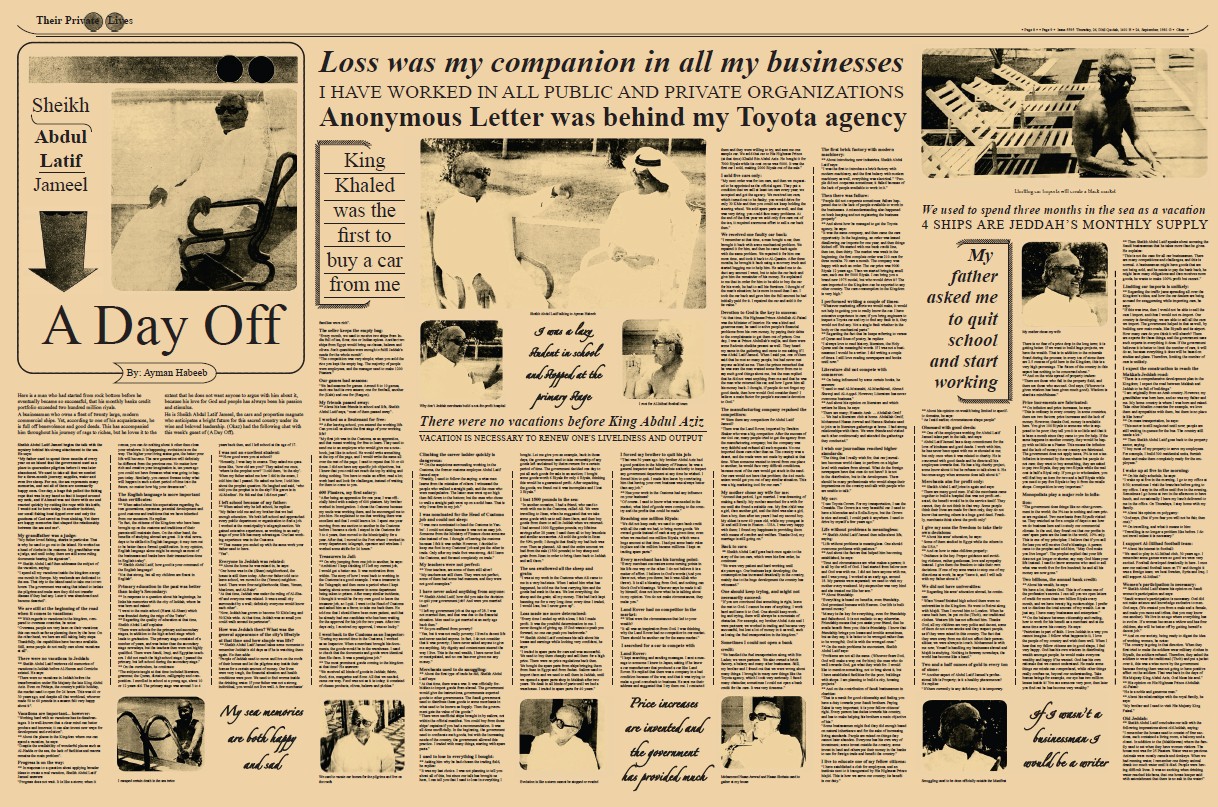
And make an effort is exactly what he did.
Today, Abdul Latif Jameel is a multinational organization, employing over eleven thousand people (referred to as Associates) from over 80 nationalities in dozens of businesses across more than 35 countries on six continents, worldwide, encompassing an array of cultures. It has forged longstanding partnerships with globally-recognized names like Toyota Motor Corporation, Imperial College London and MIT, and across multiple sectors – mobility, financial services, investment, real estate, renewable energy, water and environmental services, health, consumer products, facilities management, lean management consulting, and much more.
Such an enduring impact can be no accident.
It is predicated on a foundation of ideas, values, and behaviors that still guide the network of Abdul Latif Jameel business to this very day. Many of which reflect the unique experiences and character of the late founder himself.
“I witnessed the people who walked a straight path, and the ones who were manipulative. The latter ones went up so high then fell down to the bottom; but the ones who chose to walk a straight path went up on a solid base,” said Sheikh Jameel, outlining his honest approach to business in his 1984 Okaz interview.
Founder’s principles helped to shape a new future
Abdul Latif Jameel believed that the purpose of life extends far beyond mere personal advancement alone. Rather, it covers a wider and deeper responsibility for addressing the needs of the many, improving prospects for all, and unleashing everyone’s personal potential.
“Every person has duties towards his country and has to make helping his brothers a main objective,” he said.
Himself a man of humble origins, Mr. Jameel empathized with the plight of the ordinary citizen. He began his career following in the footsteps of his father, working in the Customs Office as an apprentice and working his way up from the bottom rung. Later, when he forged a successful career as a merchant and trader, he recalled those early struggles and started giving back to society which had nurtured him and offered such opportunities. Abdul Latif Jameel built quality homes for the families of people who worked for him, alongside healthcare facilities and social clubs, establishing embryonic communities with a family spirit. His business was also the first private company to establish a training facility for vocational and management training.
And, realizing the personal and economic freedom offered by personal transport, in an effort to widen access to Toyota vehicles, Abdul Latif Jameel was one of the first to pioneer installment-based sales in the early 1960s for both individuals and small businesses, even before the domestic consumer financial services market was really recognized (leading to the foundation of Abdul Latif Jameel Finance, Saudi Arabia in 1979).
It was easy, in those early years as a trader, for the founder to personally oversee his business from his office, knowing all staff by name and ensuring the high values he cherished were upheld. As the business grew, that level of personal oversight became harder, but he determined that the Abdul Latif Jameel business would not fall into the trap of many large corporations, which often lost sight of their foundational principles and values as they grew.
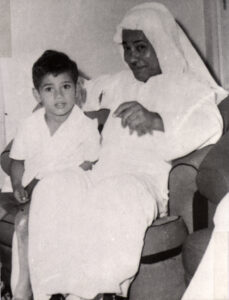
Abdul Latif Jameel, today, remains a family-run business, its culture and values protected from the short-term goals of ever-changing CEOs and leadership teams.
The late Abdul Latif Jameel made a significant investment in his sons’ and daughters’ education from an early age, sending them abroad to Egypt and the US for their studies to which some later added Japan.
This demonstrated his strong belief in the importance of global learning and the value he placed on their future success. Today, his son and grandsons, respectively, still run the business: Mohammed Jameel, KBE (Chairman); Fady Jameel (Vice Chairman, International), Hassan Jameel (Vice Chairman, Saudi Arabia), Faisal Alsamannoudi (Chairman, Abdul Latif Jameel Enterprises) and Hisham Hamza (Chairman, Abdul Latif Jameel Electronics).
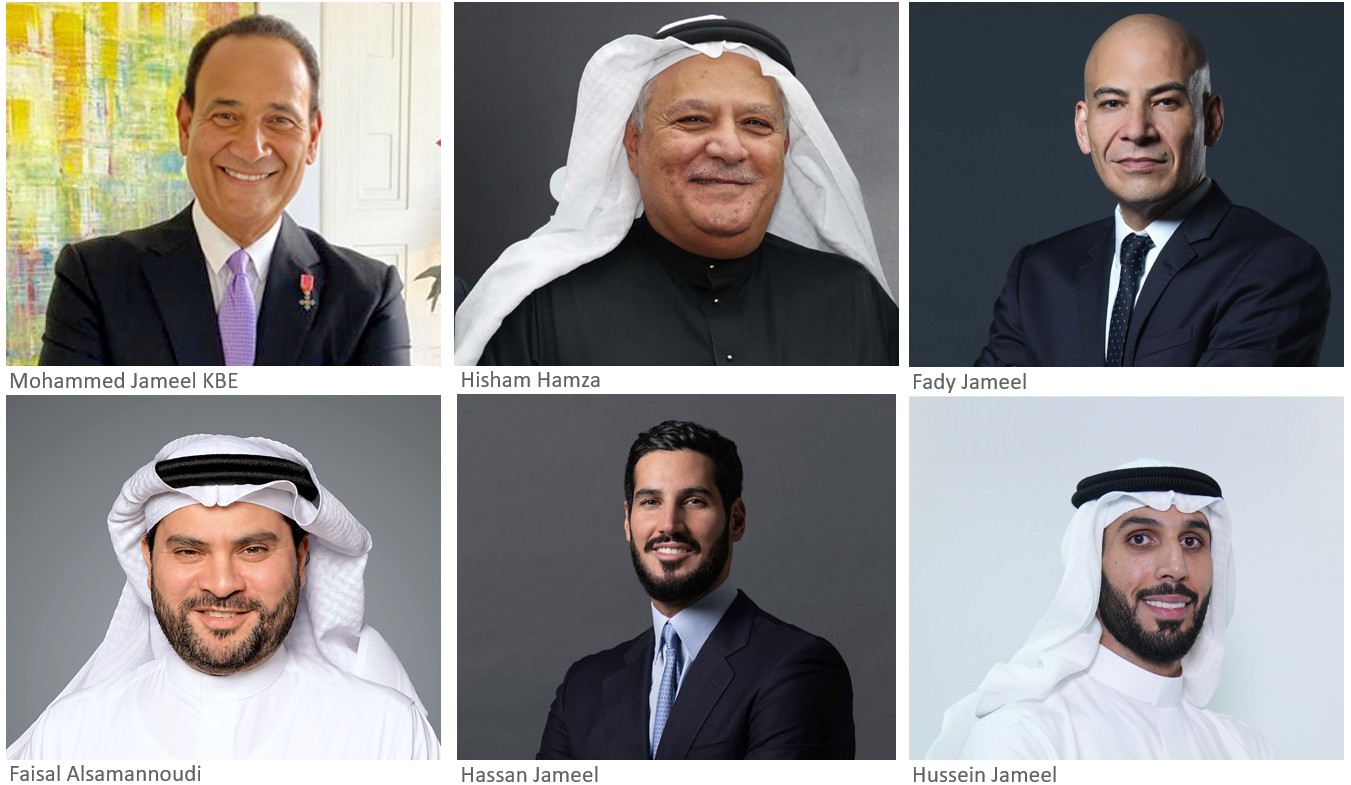
The second and third generation: from left to right: Mohammed Jameel, son of our late Founder, and Hisham Hamza, Fady Jameel, Faisal Alsamannoudi, Hassan Jameel, and Hussein Jameel, all grandsons of our late founder. © The Jameel Family.
Inspired by the founder’s vision, they have solidified and developed his ethos into a set of four fundamental values which underpin the organization’s approach to its people and business dealings. These are as pertinent and applicable today as they have ever been in the businesses 80-year heritage:
- Respect: Treating all people equally and fairly, whether they are colleagues, customers or commercial partners.
- Improve: Encouraging people to make incremental changes to the way they do things in order to make a dramatic cumulative impact.
- Pioneer: Motivating people to think outside the box, challenge the status quo and not be afraid of making mistakes in the quest for improvement.
- Empower: Giving people the freedom to make decisions and take responsibility for their actions.
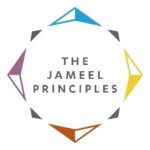 These values, today enshrined in what are known as The Jameel Principles, have helped the business stay true to its roots through decades of great change.
These values, today enshrined in what are known as The Jameel Principles, have helped the business stay true to its roots through decades of great change.
This period has heralded the rise of the global business community, technological revolutions, affordable international travel, the emergence of human rights, longer lifespans, the liberating power of the internet – and the specter of cataclysmic climate change.
Passions embedded in DNA of modern company
The values and ethos of the late Abdul Latif Jameel have guided the business’s direction over the last eight decades.
“My dignity and contentment steered the way I live,” he explained in his newspaper retrospective. “This is the real wealth. I have never lied or manipulated, and no one has ever given me any money.”
Without his commitment to honesty and transparency, he might not have secured the vital distribution deal with Japanese carmaker Toyota in 1955 – an agreement which went on to turbocharge the business’s growth. By building up slowly from a solid base and, in his own words, “walking a straight path”, he managed to create an enduring success story.
To this day, Abdul Latif Jameel as a business supports people from all backgrounds who are passionate about improving their own lives. The company’s financial inclusion activities, bringing investment and credit to people in emerging economies, help unlock the potential of anyone with the will to work and the drive to succeed. Likewise, the Jameel Family’s independent philanthropic activities, including for example the Abdul Latif Jameel Poverty Action Lab (J-PAL), (founded in 2003 at the Massachusetts Institute of Technology (MIT), and supported by Abdul Latif Jameel since 2005), strives to narrow the opportunity gap between socioeconomic classes, touching the lives of hundreds of millions worldwide. Indeed two of J-PAL’s co-founders, Abhijit Banerjee and Esther Duflo, were awarded the 2019 Nobel Prize for Economics in recognition of their groundbreaking approach to poverty alleviation.
The late Abdul Latif Jameel believed such opportunities should be available for all, irrespective of wealth, background or gender. And this essential belief in the need to empower women in society from the very beginning led, ultimately to the creation of the dedicated Nafisa Shams Academy and company – a comprehensive system of more than 50 accredited training, mentoring and business skills, to enable women to contribute to their own and their nation’s economic and social development – today with over 80 partners, more than 17,000 trainees and having produced over 1.25 million handicraft products.
In his 1981 newspaper interview, he spoke of the march of progress and changing attitudes. “Saudi women’s participation is necessary,” he explained, adding, “We live in an age where everything has to evolve.” It is an ethos the business respects to this day.
‘In the beginning’: The late founder, Abdul Latif Jameel (left) was appointed the official distributor for Toyota products in Saudi Arabia in 1955. He is pictured here with Khaled Al Habash, the business’ first vice president, and Mr. Inue and colleagues representing Toyota Motor Corporation with the Toyota BJ Cruiser (circa 1950s). © The Jameel Family
Meanwhile, the Jameel Family’s independent job creation and training initiative, Bab Rizq Jameel, has secured job opportunities for more than 1,000,000 people across the MENA region, serving more than 1,400 employers, and providing 3 Billion Saudi Riyals in microloans to Small and Medium Enterprises. Moreover, the Jameel Family’s entrepreneurship support initiative, continues to accelerate, with the company holding its inaugural Rally Jameel in 2013, the first world-class navigational rally in the region exclusively for women.
A respect for technical innovation is also evident in the founder’s worldview. The Toyota 4x4s he imported early in his career were the perfect antidote to the Kingdom’s dusty desert roads, which were notorious for leaving ordinary cars stuck in sand in the 1940s and 50s.
“Our cars would not have that problem,” he explained. “The 4×4 mechanism would get you out of any similar situation.”
Even after the founder’s passing in 1993, the Abdul Latif Jameel business continued to forge new partnerships with cutting-edge motor manufacturers, landing distribution deals across the MENA region. Importing cars helped mobilize a society and transform Saudi Arabia from a country crisscrossed with unsealed roads to one with a network of modern highways and international airports.
Abdul Latif Jameel’s passion for mobility is a legacy which it continues to honor by looking forward into the future of mobility, signing major investments in electric car pioneer RIVIAN and Joby Aviation, the California-based tech firm developing an electric air taxi and announced the signing of a MoU in June 2025, to explore opportunities to establish a distribution agreement in Saudi Arabia with the potential of up to 200 Joby aircraft and related services (valued at circa US$ 1 billion) expected over the coming years. In the long-term, Abdul Latif Jameel and Joby also see potential revenue opportunities across the Middle East. And in 2022, Abdul Latif Jameel also made a strategic investment in Greaves Electric Mobility, one of India’s leading two/three-wheeler EV manufacturers. The agreement offers the prospect of truly affordable and sustainable mobility to poorer communities in the most populous nation on Earth.
Building on this, more recently, the expansion in the international mobility sector has included distribution of the hi-tech Chinese brands, MG Motor, GAC Motor, Changan, and Geely Auto, together with Geely’s Farizon Auto new energy commercial vehicles and Chery Group’s ‘OMODA & JAECOO’ brands. This extends the business’ geographic automotive footprint to include new markets of Australia, Poland, South Africa, the UAE, the UK, and most recently, Italy and Iraq. This in addition to Morocco, Algeria, Egypt, Monaco, Türkiye, (previously Syria prior to 2012), China, Japan and of course where it all started with Toyota: Saudi Arabia.
Technology, to Abdul Latif Jameel, didn’t just mean vehicles. Technology as a concept was a passport to progress to opportunity – to the future. Fundamentally, he regarded technology as a means to improve life for himself and for others.
Today, the Abdul Latif Jameel business continues its founder’s passion for investing in ambitious technology. Nothing showcases this better than the activities of its flagship renewable energy business, Fotowatio Renewable Ventures (FRV), alongside its innovation wing, FRV-X. Part of Jameel Energy, FRV manages a growing portfolio of solar photovoltaic renewable energy and battery storage projects across the Middle East, Australia, Europe and Latin America, with a vision to democratize access to economically viable renewable power for all. FRV-X is also exploring new digital business models, and new technologies from green hydrogen, green ammonia and Behind-the Meter-(BTM) energy storage solutions, and AI-powered energy use efficiency.
It is this same enthusiasm for the liberating power of technology that has seen the Jameel family support cutting edge research, for example, with the co-founding by Community Jameel and MIT in 2014 of the Abdul Latif Jameel Water & Food Systems Lab (J-WAFS) created to address issues of water and food security and to support and commercialize food and water technologies tackling urbanization, climate change and rising populations. Or indeed, platforms for adapting to the long-term impact of climate change, such as the Jameel Observatory Climate Resilience Early Warning System Network (CREWSnet).
Technology also propels the work of Almar Water Solutions, part of Jameel Environmental Services since 2016, to secure access to potable water for communities across the world. Today, after rapid growth, Almar’s footprint stretches from Chile to Australia and their portfolio includes major infrastructure projects and specialized water services through its Services division. Almar’s portfolio includes one of the world’s largest desalination plants at Shuqaiq on Saudi Arabia’s Red Sea Coast providing over 450,000 m3/day, to the population, agricultural and industrial activities of Asir and Jizan provinces, home to nearly 4 million people. Also, the Zuluf water treatment plant with a 185,000 m3/day capacity supporting the Zuluf Onshore Oil Facilities project, in the Arabian Gulf, which with Shuqaiq 3, brings Almar’s water treatment capacity will reach 635,000 m3/day, making it one of the key players in Saudi Arabia’s water market.
Other notable portfolio projects include Bahrain’s Muharraq Wastewater Treatment plant – a 100,000 m3/day state-of-the-art facility – the first 16.5 km deep gravity sewer conveyance system in the GCC, and the Centinela project, Chile, a strategic initiative, including a 144km pipeline conveying 110,678 m3 of seawater daily some 60km north from the mining site at Michilla, (to Centinela’s port), plus a new 144 km 56,333 m3/day pipeline facilitating the planned expansion of Nueva Centinela.
Advances like Shuqaiq would have been an objective close to the heart of the late Abdul Latif Jameel, who remembered water being a precious commodity in Saudi Arabia. In his early life, he recalled, homes lacked plumbing. “It was so exciting when drinking water reached kitchens, that one housekeeper said with astonishment that there is no salt in the water!” he reminisced.
The homes, clubs and medical facilities he helped fund or build for the families of employees showed an unfailing belief in the importance of ‘community’ – and moreover in a desire to ‘help community to help themselves’, gaining independence and resilience in the process. His efforts symbolized the notion of ‘family’ spreading beyond its literal definition to encompass whole neighborhoods and societies.
One finds modern-day echoes of these principles throughout the business and the family’s philanthropies, with a particular focus on entrepreneurship, education and health.
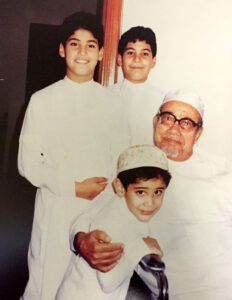
Cofounded by Community Jameel and MIT, the Abdul Latif Jameel World Education Lab (J-WEL) delivers research programs for educators worldwide, aiming to transform learning and encourage upskilling. The Transforming Education, Shaping Children’s Future (EJADA, formerly TREE) program, a collaboration between Save the Children & MIT J-WEL, comprises a systems-wide teacher training utilizing compassion to help them overcome trauma to deliver effective teaching. A thriving demonstration that learning is for all, not the privileged few. Building on this success, Community Jameel launched the Jameel Clinic in 2018, also in partnership with MIT, focusing on the development of early diagnostics and drug discovery, followed by the Jameel Institute with Imperial College London in 2019, with the aim of utilizing the expertise in data analytics to help combat disease threats worldwide.
The Jameel Clinic has quickly become the epicenter of AI in healthcare at MIT, driving the creation and adoption of high-precision, affordable and scalable AI technologies to revolutionize healthcare across clinical AI and drug discovery. Its research has led to significant breakthroughs and discoveries, including new antibiotics halicin and abaucin, and the development of clinical AI tools, such as MIRAI and SYBIL.
Continuing to trail-blaze, researchers at MIT CSAIL and Jameel Clinic, alongside techbio company Recursion recently announced the open-source release of Boltz-2, a first of its kind biomolecular foundation model. This next-generation AI model achieves best-in-class accuracy in predicting both molecular structure and binding affinity simultaneously with unprecedented speed (1,000x faster) and scale, with reduced cost giving R&D teams a powerful tool to triage more effectively and focus resources on the most promising new drug compounds.
Alongside this, in the commercial world, Jameel Health has brought that same spirit of community, wellbeing and innovation to the healthcare sector, with a particular focus on therapeutics and pharmaceuticals, and with the acquisition of Genpharm, a focus on rare disease treatment.
In the spirit of its founder, for whom business and philanthropy came hand in hand, it is evident that many of Abdul Latif Jameel’s current activities complement the UN’s 17 Sustainable Development Goals. These include commitments to clean water, affordable green energy, sustainable communities, quality education, and good health and nutrition for all.
None of these initiatives – which together raise the prospect of a safer, fairer and more enduring world – would have been possible without the foresight and drive of the man who started it all, the late Abdul Latif Jameel
Founder helped lay groundwork for modern world
Sheikh Abdul Latif Jameel was the type of visionary you might encounter once in a generation: An innovator capable of ‘big picture’ insights, with an uncanny knack of imagining a future very different from the world into which he was born.
“Every merchant encounters some turning points in his life one way or the other… You do not make circumstances, they make you,” he believed.
He was a person whose modest origins instilled in him a respect for ordinary men, women and families. A man whose belief in hard work and integrity opened many doors. A man whose weekends spent sea-fishing with his father off the coast of Jeddah seeded a deep appreciation for the natural environment, and whose fascination with technology saw him forge international partnerships with global innovators.
Each of these passions helped nurture the multi-disciplinary empire that is today’s Abdul Latif Jameel, a business operating at the cutting-edge of technology, investment and philanthropic endeavor.
Our modern world is barely recognizable from the world of 80 years ago. In 1945 the world had a population of around two billion. Comparatively few people ventured beyond the country of their birth. Even in the developed nations of Europe, fewer than one-in-five adults owned a car.[1]
Abdul Latif Jameel established his eponymous business in the same year the United Nations was founded, heralding a new approach to global collaboration and a desire to mobilize empathy around the world. Nowadays, in contrast, humanity is a complex and interconnected global community. We are busy nurturing AI, planning trips to Mars, and exchanging some US$ 32 trillion in global trade each year.[2]
Together, we share the fruits of art, commerce, science and sport. Yet we also face existential challenges like climate change and global warming, crises that could not be envisaged in 1945.
The versatile, flexible structure of Abdul Latif Jameel, straddling multiple industries and serving as a catalyst for ambitious change, has allowed the business to stay at the vanguard of progress during a period of unprecedented development.
Abdul Latif Jameel, the business, reverberates still with the Sheikh’s wisdom, humanitarianism and altruism.
“Some people think their lives are made for them only. They do not know that serving others is a huge, good deed,” he said in his 1981 interview.
Nothing could be truer in his later life, when suffering from poorer health himself, he envisaged an accessible, non-profit rehabilitation center that would dramatically aid the quality of life in Jeddah for the elderly. In 1994, he bought the land but sadly passed way before realizing his dream. His children and family continued the work, with a state-of-the-art rehabilitation center opening in 1997, which in 2009, became today’s not-for-profit Abdul Latif Jameel Rehabilitation Hospital, celebrating its 30th anniversary in 2025.
Abdul Latif Jameel remains a team of people committed to improving lives around the world, offering hope of a brighter tomorrow to the young generations of today.
The future promises to be challenging but, inspired by the ethos of our founder, the Abdul Latif Jameel businesses will continue to play a leading role investing in the ‘infrastructure of life’ and driving positive change for, hopefully, the next eight decades and beyond, drawing people, ideas and capital together, all working together…
. . . towards a more beautiful tomorrow.

[1] https://www.statista.com/statistics/1073212/europe-cars-per-thousand-people-by-region-historical/
[2] https://unctad.org/publication/global-trade-update-july-2024
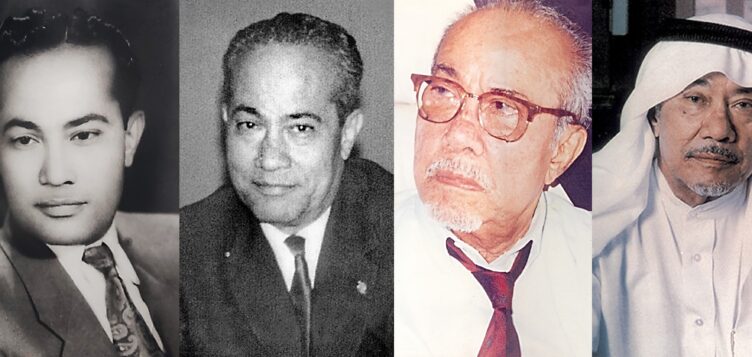




 1x
1x

 Added to press kit
Added to press kit


